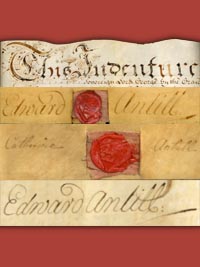General John Macquarie Antill and John's daughter,
Rose Antill-de Warren, wrote THE EMANCIPIST, An Historical Drama in three acts.
[New Jersey Biographical Sketches, 1665-1800]
Henry Colden, b. 1779; left America at an early age, and served in the army in India,
receiving a medal for courage shown at the Battle of Seringapatun. He returned to England,
where he spent a few months, and then went to New South Wales, as aide-de-camp to
Governor John Macquarie, of that Colony. He eventually settled there, married Eliza Wills, in
1818, and d. in 1852 on his estate at Jarvisfield (so called by him after Gov. Macquarie's
estate in Scotland), Picton, N. S. W. Part of this estate is called Coldenham.
John Macquarie, b. Liverpool, N. S. W.; named after his father's friend, Governor Macquarie.
[Elizabeth Macquarie's Journal.
15 May - 25 December 1809]
Records an account by Elizabeth Macquarie of the
voyage from St. Helens, England to Port Jackson,
New South Wales (via Madeira, Rio de Janeiro and
Cape Town) on board the naval storeship Dromedary,
accompanied by the man-of-war H.M.S. Hindostan.
Also travelling on the Dromedary with the Macquaries
were their servants (George Jarvis (manservant),
Robert Fopp (butler), Joseph Bigg (coachman), Mrs.
Ovens (cook), Mrs. Jones (waiting woman for
Elizabeth Macquarie)) Deputy Judge-Advocate Ellis
Bent (and his wife and son), Captain Henry Colden
Antill, Ensign Alexander Huey, Ensign John
Maclaine (Elizabeth Macquarie's nephew), as well as
other officers and rank and file of the 73rd. Regiment,
and 136 women and children.
The Dromedary was commanded by Samuel Pritchard
(Master), with a crew of 102 sailors.
Original held in Mitchell Library, Sydney.
[ML Ref: C126]
[History of Radcliffe Area]
HENRY COLDEN ANTILL, a neighbour of Owen Bowen, was born in New York. He arrived in the Colony aboard HMS Dromedary on 29th December 1809. Antill
was an Aide-de-Camp to Governor Macquarie, and he ultimately established an Estate near Picton called "JARVISFIELD". In 1828 during a drought Antill was
forced to send his sheep and cattle to the Molonglo Plains. He established an estate at Primrose Valley which was to remain in the family until 1862 when it
was acquired by Thomas Rutledge and absorbed into "Carwoola".


